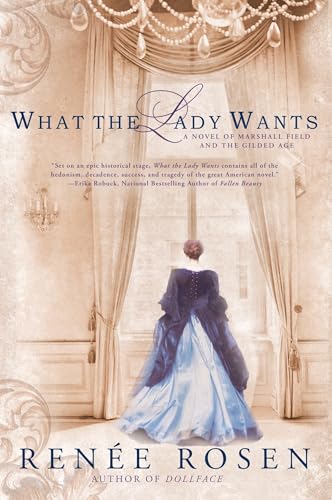When the novel opens, 17 year old Delia (Dell) Spencer, daughter of a wealthy dry goods purveyor, is attending a ball celebrating the opening of Palmer House in Chicago just as the Great Chicago Fire of 1871 starts. It is here that the young woman will first meet Marshall Field, her father's rival, a married man twenty years her senior, with whom she becomes completely intrigued and he equally intrigued by her. Despite the devastation of the fire, which wipes out rich and poor alike, Field rebuilds his store, turning it into the famed department store that bore his name. And while he rebuilt his store into something grander and visionary, his personal life and marriage continued to be unhappy. Dell meanwhile is reacquainted with Arthur Caton, eventually marrying the wealthy young man only to quickly realize that their marriage was not destined to be happy for reasons beyond her control. But she plays at the frivolous and unfulfilling life of a rich woman as expected by society even as she continues to be conscious of and attracted by Marsh. Eventually their mutual attraction cannot be stopped, the two of them embarking on an affair that causes their respective spouses to react quite differently and sets Chicago society on its ear.
This is very much a love story between Dell and Marsh and much less of the story of his founding of Marshall Field's department store. With the narrative centered on Dell, the reader sees all of the action from her perspective so there's more insight into her marriage and her deep love and obsession for Marsh, her appreciation for his genius, and the impact their affair had on her life as a society matron than there is on his feelings about any of it. The time period is very thoroughly evoked; in fact, early on there's a bit of an info dump feeling to the narrative. Certainly major historical events happened in Dell's lifetime, the Great Fire, the Haymarket Incident, and the Chicago World's Fair and each of these drove the narrative to greater or lesser degrees but some of the information given on these events still sits awkwardly in the story. The novel is both historical and biographical fiction and while it is definitely engaging, keeping the reader turning the pages, it is also a bit uncomfortable to know that Rosen created stories for Arthur and Nannie that reflects badly on them given that they were real human beings about whom not that much is known purely for narrative tension. These invented stories certainly make Dell and Marsh's long love affair more forgivable and understandable than it might be otherwise. Dell's position, in spite of her charity work, very much highlights the essential uselessness of women in the eyes of high society, especially a woman who did not have children, and this position, and the repeated tragedies and nastiness that Dell suffers despite her incredibly privileged life, will evoke sympathy for her. Her hero worship of Marsh, though, gets rather old and one-note. Marsh himself stays far more enigmatic than Dell here. This novel's reader would do well to remember this is fiction but it can also be pure, fun escapism.





No comments:
Post a Comment
I have had to disable the anonymous comment option to cut down on the spam and I apologize to those of you for whom this makes commenting a chore. I hope you'll still opt to leave me your thoughts. I love to hear what you think, especially so I know I'm not just whistling into the wind here at my computer.